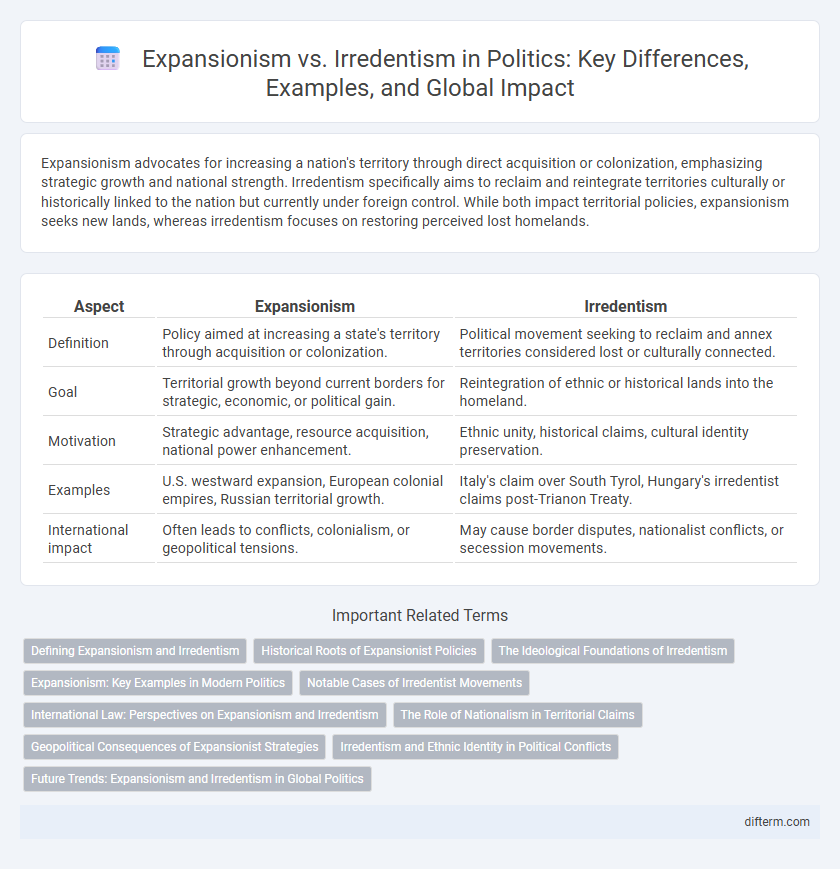Expansionism advocates for increasing a nation's territory through direct acquisition or colonization, emphasizing strategic growth and national strength. Irredentism specifically aims to reclaim and reintegrate territories culturally or historically linked to the nation but currently under foreign control. While both impact territorial policies, expansionism seeks new lands, whereas irredentism focuses on restoring perceived lost homelands.
Table of Comparison
| Aspect | Expansionism | Irredentism |
|---|---|---|
| Definition | Policy aimed at increasing a state's territory through acquisition or colonization. | Political movement seeking to reclaim and annex territories considered lost or culturally connected. |
| Goal | Territorial growth beyond current borders for strategic, economic, or political gain. | Reintegration of ethnic or historical lands into the homeland. |
| Motivation | Strategic advantage, resource acquisition, national power enhancement. | Ethnic unity, historical claims, cultural identity preservation. |
| Examples | U.S. westward expansion, European colonial empires, Russian territorial growth. | Italy's claim over South Tyrol, Hungary's irredentist claims post-Trianon Treaty. |
| International impact | Often leads to conflicts, colonialism, or geopolitical tensions. | May cause border disputes, nationalist conflicts, or secession movements. |
Defining Expansionism and Irredentism
Expansionism refers to a political policy aimed at increasing a nation's territorial boundaries through conquest, colonization, or annexation, seeking to enhance power and influence. Irredentism specifically involves a movement to reclaim and reoccupy a "lost" or culturally affiliated territory perceived to belong historically or ethnically to the nation. Both concepts shape nationalist agendas but differ in scope, with expansionism broadly pursuing growth and irredentism targeting reunification of divided ethnic or national populations.
Historical Roots of Expansionist Policies
Expansionist policies have historically been driven by the desire of states to increase territorial control, often justified through economic resources, strategic advantages, or national prestige. Rooted in imperial legacies, these policies frequently draw on narratives of manifest destiny or civilizational mission to legitimize conquest and annexation. Irredentism, by contrast, centers on reclaiming territories inhabited by ethnic or cultural kin, linking political claims to historical boundaries and national identity, as seen in the dissolution of empires and the redrawing of borders after major conflicts.
The Ideological Foundations of Irredentism
Irredentism is ideologically rooted in the quest to reclaim territories perceived as historically or ethnically linked to a nation-state, emphasizing cultural unity and national identity. This ideology exploits historical narratives, collective memory, and ethnic kinship to legitimize claims over disputed regions. Unlike general expansionism, which pursues territorial growth for economic or strategic reasons, irredentism specifically seeks reintegration of lost lands to restore an idealized national homeland.
Expansionism: Key Examples in Modern Politics
Expansionism in modern politics is exemplified by Russia's annexation of Crimea in 2014, reflecting strategic territorial growth driven by national interests. China's Belt and Road Initiative also demonstrates expansionist ambitions through economic and infrastructural influence across Asia, Africa, and Europe. These cases underscore how expansionism prioritizes extending sovereign control beyond existing borders to enhance geopolitical power.
Notable Cases of Irredentist Movements
Notable cases of irredentist movements include the annexation of Crimea by Russia in 2014, which sparked international condemnation and highlighted nationalist claims over historically contested territories. The unification efforts of Greater Serbia during the Yugoslav Wars emphasized ethnic and historical claims to expand Serbian dominance across multiple Balkan states. In East Asia, China's claims over Taiwan reflect a potent irredentist agenda driven by the narrative of national reunification and historical sovereignty.
International Law: Perspectives on Expansionism and Irredentism
International law carefully distinguishes between expansionism, often viewed as aggressive territorial acquisition, and irredentism, which claims territories based on ethnic or historical ties. Expansionism is widely condemned under principles of sovereignty and non-aggression enshrined in the UN Charter, while irredentist claims sometimes invoke self-determination rights under international statutes. Legal debates emphasize the need to balance territorial integrity with legitimate populations' aspirations, frequently complicating conflict resolution and diplomatic negotiations.
The Role of Nationalism in Territorial Claims
Nationalism drives both expansionism and irredentism by fostering a collective identity that justifies territorial claims based on historical, ethnic, or cultural ties. Expansionism seeks to increase state power and influence by acquiring new territories beyond current borders, often motivated by national pride and economic ambitions. Irredentism emphasizes reclaiming lost or culturally linked lands, legitimizing demands through appeals to a shared national heritage and the right to self-determination.
Geopolitical Consequences of Expansionist Strategies
Expansionist strategies often lead to increased geopolitical tensions as states pursue territorial acquisition to enhance power and resources, potentially triggering conflicts and regional instability. Irredentism, driven by ethnic or historical claims, can exacerbate nationalist sentiments and cross-border disputes, undermining diplomatic relations and international cooperation. These approaches risk provoking alliances and counterbalancing coalitions among affected states, fundamentally reshaping geopolitical landscapes and security dynamics.
Irredentism and Ethnic Identity in Political Conflicts
Irredentism centers on reclaiming territories inhabited by ethnic kin outside a nation-state's borders, often intensifying political conflicts through appeals to shared cultural and historical identities. Ethnic identity becomes a powerful mobilizing force, as groups seek to rectify perceived historical injustices or territorial losses, reinforcing nationalist agendas. This dynamic complicates conflict resolution by intertwining territorial claims with deeply rooted ethnic narratives and collective memories.
Future Trends: Expansionism and Irredentism in Global Politics
Future trends in global politics indicate a complex interplay between expansionism and irredentism, driven by resurging nationalist movements and strategic geopolitical interests. States are increasingly leveraging historical territorial claims and ethnic affiliations to justify policies of border adjustment and influence expansion. Advances in military technology and cyber capabilities further empower nations to pursue these ambitions with greater precision and lower overt confrontation.
expansionism vs irredentism Infographic

 difterm.com
difterm.com